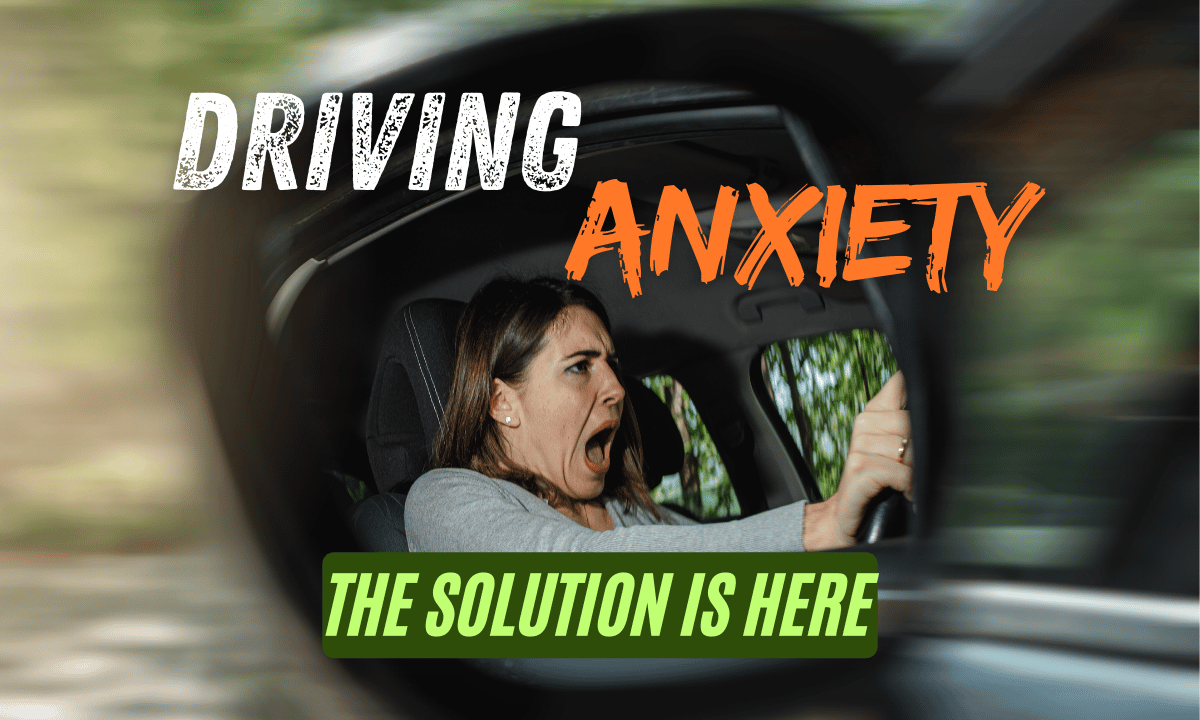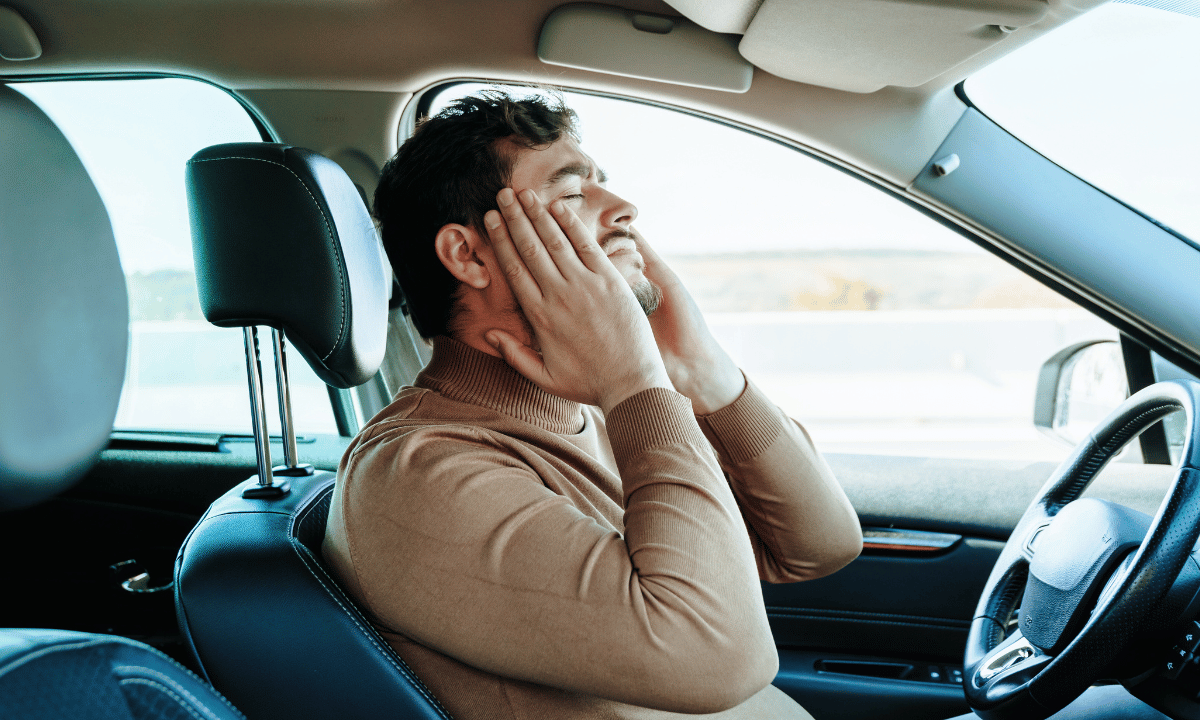Driving Anxiety is Ruining My Life | How Hypnotherapy Can Help
Interlude Hypnotherapy

Published: October, 2024
Does the thought of getting behind the wheel fill you with dread? Are you avoiding driving altogether, planning elaborate routes to stay off busy roads, or relying on others for transport? If so, you’re not alone. Driving anxiety affects millions of people worldwide, transforming what should be a simple journey into a source of overwhelming fear and stress.
For many, driving represents freedom and independence. But when anxiety takes hold, the car becomes a prison, and every journey feels like navigating through a minefield of potential disasters. If driving anxiety is limiting your opportunities, affecting your relationships, or preventing you from living the life you want, this guide will help you understand why it happens and, most importantly, how hypnotherapy can help you reclaim your confidence behind the wheel.
What is Driving Anxiety?
Driving anxiety is a psychological condition characterised by intense fear or nervousness when driving or even thinking about driving. It exists on a spectrum, ranging from mild unease in certain situations to complete avoidance of driving altogether.
Understanding the Difference: Anxiety vs Phobia
Whilst the terms are often used interchangeably, there’s a subtle distinction between driving anxiety and driving phobia (amaxophobia):
- Driving anxiety is a broader term encompassing general fear or discomfort related to driving
- Driving phobia (amaxophobia) is a specific, intense, and often irrational fear of driving that significantly disrupts daily life
The key difference lies in severity and impact. Someone with driving anxiety might feel nervous about motorway driving but can still manage local roads. In contrast, someone with a driving phobia may be unable to get behind the wheel at all, even as a passenger.
Regardless of the label, what matters most is whether your fear prevents you from living the life you want. Recent research suggests that approximately one in seven motorists experiences anxiety that negatively affects their driving ability, making this a remarkably common issue.
Common Causes of Driving Anxiety
Understanding what triggers your driving anxiety is crucial for addressing it effectively. The causes often stem from a combination of personal experiences, learned behaviours, and environmental factors.
Past Traumatic Events
One significant cause of driving anxiety is experiencing or observing a road traffic accident. The emotional impact of such events can create lasting psychological scars, causing your brain to associate driving with danger. Even if you weren’t directly involved, witnessing an accident or hearing detailed accounts from others can be enough to trigger anxiety.
Interestingly, you don’t need to have experienced a real accident to develop these fears. Sometimes, repeatedly imagining worst-case scenarios can create the same emotional response as if the event actually occurred.
Learned Behaviours
If you grew up with anxious drivers, you may have unconsciously absorbed their fears and responses. Children are particularly susceptible to picking up on their parents’ emotional reactions to driving. If your primary role models displayed signs of driving anxiety, their behaviour may have influenced your own relationship with driving.
Lack of Confidence
New or inexperienced drivers often struggle with driving anxiety due to uncertainty about their abilities. The fear of making mistakes, causing accidents, or harming others can be overwhelming. This is particularly common among:
- Newly qualified drivers
- People returning to driving after a long break
- Those who learned to drive later in life
Environmental and Situational Triggers
Certain driving conditions can heighten anxiety, even for previously confident drivers:
- Weather conditions: Heavy rain, fog, snow, or ice can make driving feel more dangerous
- Traffic situations: Busy motorways, rush-hour traffic, or unfamiliar routes
- Time of day: Night driving or dawn/dusk when visibility is reduced
- Specific locations: Tunnels, bridges, or multi-storey car parks
ADHD and Driving Anxiety
Individuals with ADHD may experience heightened driving anxiety due to difficulties with concentration, impulsivity, or emotional regulation. The multitasking nature of driving can feel overwhelming, particularly in challenging conditions.
Hormonal Changes
Women experiencing perimenopause or menopause may develop driving anxiety due to hormonal fluctuations affecting stress responses and emotional regulation. This can be particularly frustrating for previously confident drivers who suddenly find themselves anxious behind the wheel.
Symptoms of Driving Anxiety

Driving anxiety manifests in various ways, affecting your body, mind, and behaviour. Recognising these signs is a crucial step in addressing them.
Physical Symptoms
Your body’s fight-or-flight response activates when you feel threatened, producing several physical sensations:
- Rapid heartbeat or palpitations
- Sweating, particularly on palms
- Muscle tension, especially in shoulders and neck
- Shortness of breath or hyperventilation
- Nausea or stomach discomfort
- Trembling or shaking hands
- Dizziness or light-headedness
- Dry mouth
- Headaches
Emotional and Cognitive Symptoms
The mental aspects of driving anxiety can be equally distressing:
- Overwhelming fear or sense of dread
- Racing thoughts or mind going blank
- Difficulty concentrating on the road
- Catastrophic thinking (imagining worst-case scenarios)
- Feeling out of control or helpless
- Anticipatory anxiety (worrying about future journeys)
Behavioural Symptoms
Driving anxiety often leads to changes in behaviour as you attempt to manage or avoid the fear:
- Avoidance behaviours: Refusing to drive or only driving in very limited circumstances
- Route restrictions: Avoiding motorways, certain roads, or unfamiliar areas
- Time limitations: Only driving during daylight hours or at quiet times
- Over-preparation: Excessive planning, checking mirrors repeatedly, or driving significantly below speed limits
- Dependency: Relying heavily on others for transport
How Hypnotherapy Can Help with Driving Anxiety
Hypnotherapy offers an impactful approach to addressing driving anxiety by focusing on its subconscious origins. Unlike surface-level coping strategies, hypnotherapy helps reprogram your mind’s automatic responses to driving situations.
Understanding How Hypnotherapy Works
During hypnotherapy, individuals are guided into a deeply relaxed and focused state referred to as trance. This natural state, which we experience daily when absorbed in activities like reading or watching television, allows direct access to your subconscious mind where fears and anxieties are stored.
In this receptive state, your hypnotherapist can:
- Identify and address the core triggers of your driving anxiety
- Replace negative associations with positive ones
- Install new, confident responses to driving situations
- Build your overall sense of safety and control
Key Hypnotherapy Techniques for Driving Anxiety
Positive Suggestion and Affirmations
Your hypnotherapist uses carefully crafted positive suggestions to replace fearful thoughts with confident ones. For example, instead of anticipating danger, your mind learns to associate driving with safety, control, and calm confidence.
Guided Imagery and Visualisation
This technique involves mentally rehearsing successful driving experiences whilst in a relaxed state. You might visualise yourself:
- Calmly navigating busy motorways
- Confidently handling challenging weather conditions
- Feeling relaxed and in control during long journeys
Regression and Reframe Therapy
If your driving anxiety stems from a specific traumatic event, hypnotherapy can help you revisit and reprocess that memory in a safe environment, reducing its emotional impact on your current driving experience.
Systematic Desensitisation
This approach gradually exposes you to driving-related scenarios in your imagination, starting with the least threatening and progressively building to more challenging situations. This helps reduce your anxiety response over time.
Anchor Techniques
Your hypnotherapist can help you create mental “anchors” – specific techniques you can use whilst driving to instantly access feelings of calm and confidence when needed.
The Benefits of Hypnotherapy for Driving Anxiety
Hypnotherapy offers several advantages over other treatment approaches:
- Targets root causes: Instead of merely managing symptoms, hypnotherapy addresses the foundational beliefs and reactions that fuel anxiety.
- Natural and medication-free: Avoids side effects and dependency risks.
- Relatively quick results: Many people notice improvements within just a few sessions
- Personalised approach: Treatment is tailored to your specific triggers and circumstances
- Long-lasting change: Creates lasting shifts in your subconscious responses
Other Treatment Options for Driving Anxiety
Whilst hypnotherapy is highly effective, it’s worth knowing about other approaches that can help with driving anxiety:
Cognitive Behavioural Therapy (CBT)
CBT helps individuals identify and reshape negative thought patterns related to driving. You’ll learn to recognise catastrophic thinking and replace it with more balanced, realistic thoughts. CBT is particularly effective when combined with gradual exposure to driving situations.
Exposure Therapy
This approach involves gradually and systematically exposing yourself to driving situations that trigger anxiety, starting with the least threatening and building up over time. The key is to proceed at a pace that challenges you without overwhelming you.
Mindfulness and Meditation
These techniques help you stay present rather than getting caught up in anxious thoughts about what might happen. Regular mindfulness practice can reduce overall anxiety levels and improve your ability to cope with stressful situations.
Medical Interventions
In severe cases, your GP might prescribe anti-anxiety medication. However, this should be approached cautiously, as some medications can impair driving ability. Always discuss the potential effects with your healthcare provider.
Steps to Overcome Driving Anxiety
Whether you choose hypnotherapy or another approach, these practical steps can help you begin overcoming driving anxiety:
Start with Relaxation Techniques
Learn and practise relaxation methods you can use before and during driving:
Box Breathing: Breathe in for 4 counts, hold for 4, exhale for 4, hold for 4. Repeat several times.
Progressive Muscle Relaxation: Gradually tense and relax muscle groups to alleviate physical stress.
The 5-4-3-2-1 Technique: Identify 5 things you see, 4 you hear, 3 you feel, 2 you smell, and 1 you taste. This grounds you in the present moment.
Challenge Negative Thoughts
When you notice catastrophic thinking, ask yourself:
- Is this thought logical or constructive?
- What proof exists to support this outcome?
- What would I tell a friend in this situation?
- What’s the most likely outcome?
Gradual Exposure
Don’t try to tackle your biggest fears immediately. Instead:
- Start by sitting in your stationary car with the engine off
- Drive short distances in quiet areas
- Gradually increase distance and complexity
- Build up to more challenging situations like motorways or night driving
Prepare Thoroughly
Reduce uncertainty by:
- Planning your route in advance
- Checking weather and traffic conditions
- Ensuring your car is in good condition
- Having emergency contacts and breakdown cover
Seek Professional Support
Consider working with a qualified hypnotherapist who specialises in driving anxiety. Look for someone who is:
- Properly qualified and registered with professional bodies
- Experienced in treating driving anxiety specifically
- Able to offer a personalised approach to your situation
Why Choose Hypnotherapy for Your Driving Anxiety?
At Interlude Hypnotherapy Sheffield, I understand how driving anxiety can impact every aspect of your life. With over 25 years of experience in holistic health and wellness, I combine solution-focused hypnotherapy with complementary approaches like mindfulness and relaxation techniques to provide comprehensive support.
My approach is:
- Personalised: Tailored to your specific triggers and circumstances
- Professional: Registered with the CNHC and holding accredited qualifications.
- Supportive: Providing a safe, non-judgmental environment for change
- Effective: Using proven techniques that address anxiety at its source
Taking the First Step Towards Freedom
Driving anxiety doesn’t have to control your life. With the right support and techniques, you can overcome these fears and reclaim your driving independence. Hypnotherapy offers a gentle yet powerful way to address the root causes of your anxiety, helping you develop lasting confidence and calm behind the wheel.
Remember, seeking help isn’t a sign of weakness – it’s a courageous step towards the freedom and independence you deserve. Many successful, capable people experience driving anxiety, and with proper support, they’ve gone on to become confident, relaxed drivers.
Ready to Take Control?

If driving anxiety is limiting your life, don’t wait any longer. Contact me today for a free consultation to discuss how hypnotherapy can help you overcome your fears and start enjoying driving again. Together, we can work towards a future where getting behind the wheel feels natural, safe, and empowering.
Take that first step towards freedom – you deserve to feel confident and in control on the road.
Schedule your free consultation today to explore how hypnotherapy can reshape your driving experience.
You can click on the blue highlighted text above to book directly, or you can get in touch using the details below to arrange a booking:
Email: info@interludehypnotherapysheffield.com
Call or WhatsApp: +44 7988 912825
Facebook: https://web.facebook.com/farahnaz.khan.33
LinkedIn: https://www.linkedin.com/in/farah-naz-khan-43695215/
Instagram: https://www.instagram.com/interludehypnotherapy/




